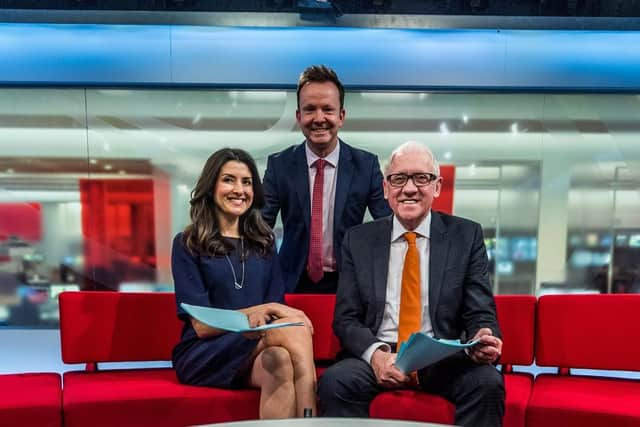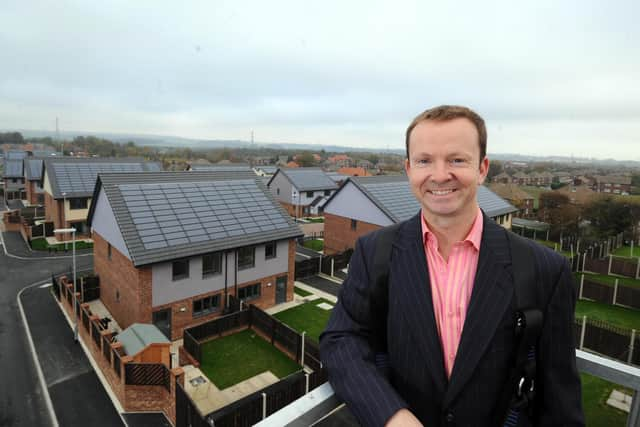BBC Look North weatherman Paul Hudson's analysis on the climate ahead of COP26
It was over 30 years ago when Margaret Thatcher gave a speech about a subject that few had heard of, or really cared about.
The year was 1990, and only the second ever world climate conference was taking place in Geneva.
Advertisement
Hide AdAdvertisement
Hide AdThe then Prime Minister compared the threat of global warming to the first Gulf War which was growing near following the invasion by Iraq of Kuwait.


She said: “The danger of global warming is yet unseen, but real enough for us to make changes and sacrifices, so that we do not live at the expense of future generations.”
But, to many, it was a concept that seemed strange – especially to the older generation who had lived through the previous few decades.
The winter of 1963 had been so harsh that barrels of beer froze over in the Tan Hill pub in the Pennines and some communities were practically cut off, for weeks on end, by snow drifts metres high as harsh winds flooded in from Siberia.
Advertisement
Hide AdAdvertisement
Hide AdStatistically that still remains the coldest winter of the 20th century.


And then there was the winter of discontent under James Callaghan’s government in 1979, which saw widespread strikes and images of the dead going unburied and uncollected rubbish piled high.
But it was also another very harsh winter – HGV drivers resorting to lighting fires underneath their vehicles in order to defrost frozen diesel lines.
Yet to Mrs Thatcher, who was coming to the end of her time in Downing Street when she spoke out, the science was already clear.
Advertisement
Hide AdAdvertisement
Hide AdIn the three decades that have passed since her speech, and despite universal acceptance amongst the world’s scientists that global warming is almost entirely man-made, we find ourselves in what is being described as "the last chance saloon".
Greenhouse gas emissions have soared in the last few decades, and global temperatures have accelerated – a warming which has so far been accurately predicted by powerful supercomputers at the UK Met Office and other meteorological organisations around the world.
In Glasgow at the COP26 summit, governments from around the world will digest the latest IPCC climate report, sponsored by the UN and written by some of the world’s leading climate scientists.
And it makes for grim reading.
Yes, some progress has been made to try and curb greenhouse gases emissions.
Advertisement
Hide AdAdvertisement
Hide AdIn the IPCC report, the central projection for global temperatures by the end of the century are around 2.7C above pre-industrial levels.
Was it not for progress made so far on limiting future greenhouse gas emissions, the central projection would have been for global temperatures to be 4.4C higher than before the industrial revolution.
But scientists insist that if we want to escape the worst effects of climate change, we must keep the temperature rise to no more than 1.5C.
Imagine for a moment what our climate would be like if global temperatures continue to accelerate further from where they are now.
Advertisement
Hide AdAdvertisement
Hide AdAlready this year we have seen ferocious heat waves across the world.
When I began my career at the Met Office records would normally be broken by around a tenth of a degree.
But in Canada and the Pacific Northwest of America, temperature records were shattered, some by a staggering five degrees celsius.
Here in Yorkshire in 2019, Sheffield recorded its highest ever February temperature, its highest ever summer temperature, and its wettest autumn on record which led to devastating flooding.
Advertisement
Hide AdAdvertisement
Hide AdIn fact, in records which began in 1882, the three wettest autumns on record have all occurred since 2000.
All this with global temperatures at around 1.15C above pre-industrial levels.
The reality is that the time for tinkering around the edges have long gone.
The IPCC report makes it very clear that the only scenario left which will hold global temperatures below the 1.5C threshold would mean a world that is carbon neutral by 2050.
Advertisement
Hide AdAdvertisement
Hide AdBut that’s not all. During the second half of the century we would have to go further - a world which is carbon negative.
In reality that would mean taking more carbon out of the atmosphere than we put in.
How will that be possible in under 30 years?
If the world’s governments agree with what scientists are saying, then huge structural changes will have to be made to the world’s economy, and the way we all live our lives, if we are to avoid potentially catastrophic changes to our climate.